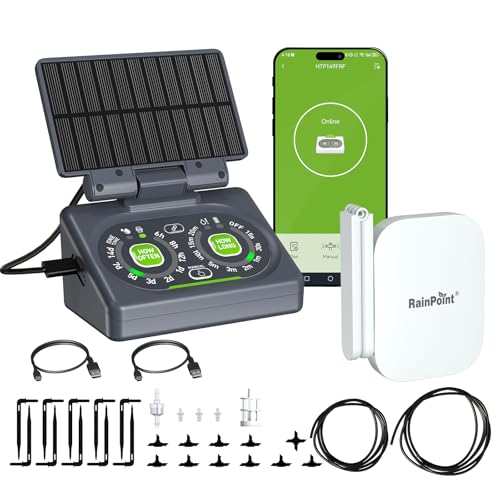Gardening has always been a labor of love, but with smart irrigation controllers, I’ve discovered a whole new way to care for my plants effortlessly. These innovative devices take the guesswork out of watering by adjusting schedules based on weather forecasts and soil moisture levels.

Not only do smart irrigation controllers save me time, but they also help conserve water, ensuring my garden stays vibrant without wasting a drop. Embracing this technology has transformed my gardening routine, making it easier to maintain a lush landscape while being environmentally conscious.
Environmental Benefits
Smart irrigation controllers contribute significantly to environmental sustainability by optimizing water usage and reducing energy consumption.
Water Conservation
I use smart irrigation controllers to precisely manage my garden’s water needs. These devices adjust watering schedules based on real-time weather data and soil moisture levels, ensuring plants receive just the right amount of water. On average, smart controllers can reduce water usage by up to 30%, minimizing waste and preserving local water resources.
Reduced Carbon Footprint
Implementing smart irrigation controllers lowers my garden’s carbon footprint. By automating watering, these systems decrease the need for manual adjustments, which often rely on electricity-powered devices. Additionally, efficient water usage reduces the energy required for water pumping and distribution. This combined effect can lower greenhouse gas emissions associated with traditional irrigation methods.
Cost Savings
Smart irrigation controllers help me save money by optimizing water usage and reducing maintenance expenses.
Lower Water Bills
By adjusting watering schedules based on real-time weather data, my smart controller cuts water usage by up to 30%. For example, during rain, it delays watering, preventing unnecessary water expenditure. Lower water consumption directly reduces my utility bills.
Maintenance Costs
Automated systems decrease my need for manual watering, lowering labor costs. Additionally, precise irrigation minimizes plant health issues, reducing my expenses on fertilizers and pest control. Routine maintenance becomes simpler, as my smart controller alerts me to system irregularities promptly.
Enhanced Efficiency
Smart irrigation controllers significantly boost gardening efficiency by optimizing watering schedules and integrating real-time data.
Automated Scheduling
Automated scheduling tailors watering times to your garden’s specific needs. The controller adjusts irrigation based on plant types, soil conditions, and sunlight exposure. This precision ensures each plant receives the right amount of water, preventing overwatering and underwatering. For example, roses, vegetables, and shrubs each have distinct water requirements that the system accounts for automatically.
Weather Integration
Weather integration allows the controller to respond to current and forecasted weather conditions. It uses data from local weather stations or online services to modify watering schedules accordingly. If rain is predicted, the system delays watering, conserving water and reducing costs. Similarly, during heatwaves, it increases irrigation to maintain plant health. This dynamic adjustment minimizes water waste and maintains optimal garden conditions.
User-Friendly Features
Smart irrigation controllers come equipped with intuitive features that make gardening effortless.
Remote Access
I can control my irrigation system from anywhere using a smartphone app. If I forget to adjust the schedule when I’m away, the app lets me make changes in real time. Notifications alert me to any issues, ensuring my garden stays healthy without constant monitoring.
Easy Installation
Installing a smart irrigation controller takes just a few steps, even for beginners. I follow the clear instructions provided, connect the device to my existing sprinkler system, and sync it with my home Wi-Fi. Within minutes, my smart controller is up and running, eliminating the need for professional installation.
Compatibility and Integration
Smart irrigation controllers seamlessly connect with a wide range of existing irrigation systems, including rotary sprinklers, drip lines, and rain sensors. This compatibility ensures that upgrading to a smart system doesn’t require replacing your current setup. I appreciate how these controllers integrate effortlessly with popular home automation platforms like Amazon Alexa and Google Home. This integration allows me to control my irrigation system using voice commands or through intuitive smartphone apps.
Additionally, smart controllers support various communication protocols such as Wi-Fi, Zigbee, and Z-Wave, enabling stable and reliable connections to other smart devices in my home. They also connect with local weather stations and online weather services to receive real-time updates, ensuring accurate watering schedules based on current conditions. Integrating soil moisture sensors further enhances the system’s precision by providing live data on soil hydration levels, which the controller uses to adjust watering accordingly.
Supported Protocols and Platforms
| Protocol | Supported Platforms |
|---|---|
| Wi-Fi | Alexa, Google Home, IFTTT |
| Zigbee | SmartThings, Hubitat |
| Z-Wave | HomeSeer, Vera |
The installation process is straightforward, typically involving a few simple steps to connect the controller to your existing sprinkler system and sync it with your home network. Many controllers offer mobile app support, allowing me to manage settings and monitor performance remotely. This level of compatibility and integration not only simplifies the setup but also enhances the overall functionality of my smart irrigation system.
Conclusion
Switching to a smart irrigation controller changed my gardening experience. It’s incredible how much water and time I’ve saved while keeping my plants healthy. Being able to control my system from my phone means I can manage my garden no matter where I am.
The savings on my water bill and the positive impact on the environment make this upgrade worth it. Plus the easy installation and integration with my existing setup were big pluses. If you’re looking to simplify your watering routine and make your garden more efficient I highly recommend giving smart irrigation controllers a try.
« Best Motion-Sensor Lights for Security: Top Choices to Protect Your Home How to Grow a Bonsai Garden: Ultimate Guide for Beginners and Enthusiasts »
















